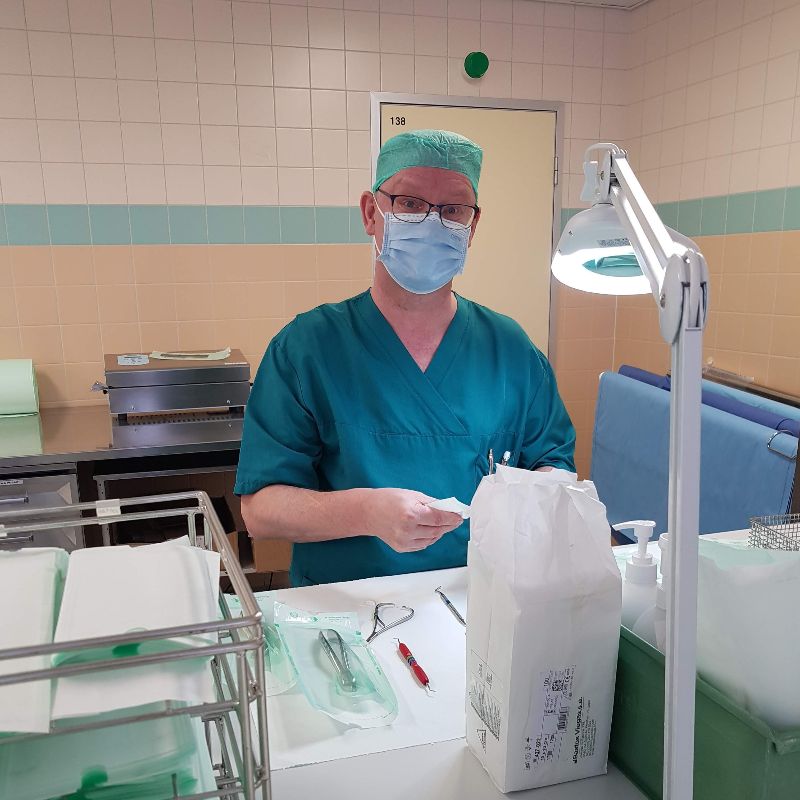Instrument technician
"I consider the work of an instrument technician to be very important and I find it meaningful and varied. My work has a clear purpose and it is directly linked to patient safety. I have always enjoyed working meticulously with tasks that require a high level of precision."

- Juuso Heikkilä
- Instrument technician at Porvoo Hospital.
- Graduated as an instrument technician from Taitotalo. Currently studying for a further vocational qualification in first-level management.
- Three years of work experience in the field.
Briefly explain what you do for a living.
I work as an instrument technician in the equipment maintenance centre of Porvoo Hospital’s intensive care and surgical ward. My tasks include cleaning, sterilising and packing instruments used in the operating rooms. I also maintain medical equipment for a few health centres, taking care of instruments used in dental care, gynaecology and endoscopy.
How have you ended up in the profession of your choice?
I worked in the restaurant industry for 30 years. The COVID-19 outbreak significantly affected the industry, prompting me to consider a new profession. My wife had just trained as an instrument technician and said she liked her work. I decided to follow my wife’s example and studied as an instrument technician.
I had only studied for a few months when I was presented with the opportunity to take on a role as a substitute instrument technician at Porvoo Hospital. Working alongside studying accelerated my learning. I graduated as an instrument technician, and I am still on my chosen path.
Describe your typical working day or week.
My day often starts with the re-cleaning of dental and surgical tools that were used the previous evening. After cleaning, I continue to carry out a step-by-step sterilisation of the equipment. Finally, I distribute the instruments to the operating rooms where they will be needed next. In my work, I always adhere to the aseptic workflow, which is a process that moves from tasks that are less clean towards cleaner work stages. This is continuously monitored in hospitals’ daily operations through various indicators and tests.
What kind of work environment or working hours do you have?
I work in a hospital where I face some risks and dangerous situations. The most common risks include different infectious diseases and sharp instruments, so it is important to use the correct protective equipment and adhere to guidelines. As a rule, the working shifts are between 7:00 and 20:00.
What kind of competence or qualities are required in the profession?
In the profession of instrument technicians, cleanliness and hygiene are crucial, which necessitates both accuracy and accountability. It is essential to be familiar with employment laws related to patient safety, as well as to the tools and equipment used in healthcare. Familiarisation with safety data sheets requires careful attention to detail. Instrument technicians are bound by confidentiality, which emphasises the importance of reliability in their work.
What is the best thing about your profession?
I consider the work of an instrument technician to be very important and I find it meaningful and varied. My work has a clear purpose and it is directly linked to patient safety. I have always enjoyed working meticulously with tasks that require a high level of precision.
What are the downsides of the profession or what seems challenging?
There are moments when things get quite hectic, and the wards need me to return the equipment that was just used for the following surgery. At times, it can be tough to maintain proper ergonomics while working because not all work surfaces can be modified. At the end of the workday, I sometimes notice tightness in my muscles.
What would you tell a person considering the profession of an instrument technician?
I recommend the profession of an instrument technician to those who are committed to ensuring patient safety and want to work in the healthcare sector. This is an important job, as no hospital can operate without instrument technicians.
How do you see the future of your profession?
Although certain robots and automation are used in equipment maintenance, our hospital has not adopted them yet. Even with a slight rise in automation, the demand for instrument technicians remains high, and the workforce deficit is unlikely to improve anytime soon. I am convinced that robots will not be able to completely replace humans in this particular job.
